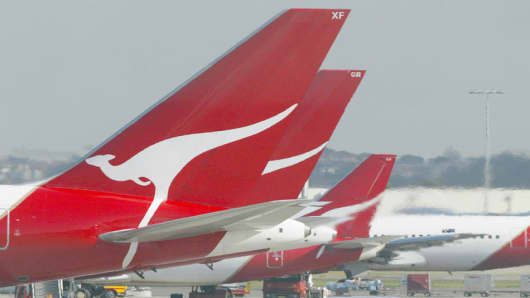Australia's biggest airline, Qantas Airways, will cut 4 percent of its workforce and scrap its growth plan for the coming year, saying the business would be at risk if it fails to offset soaring fuel prices.
The plan to cut 1,500 of its 36,000 workers was the carrier's fifth belt-tightening in three months. It has previously raised fares twice and cut capacity twice.
The global airline industry faces what its peak body calls a "perfect storm" of skyrocketing oil prices, with carriers worldwide shedding jobs and closing down routes as losses mount.
"This is one of the toughest industries out there," Qantas Chief Executive Geoff Dixon told reporters.
As part of the latest belt-tightening, Qantas also cut its forecast capacity growth for 2008/09 to nil, from 8 percent previously, and said it would scrap plans to hire another 1,200 people and also close call-centers in Tucson, Arizona and London.
Dixon voiced confidence in the airline's ability to weather the storm but reacted tersely when asked if trade unions should take the job cuts lying down, given his confidence in the future.
"Our costs have gone up over A$2 billion from year to year and if we do not act, there won't be any unions because there won't be any Qantas," he shot back.
Qantas shares stood 0.6 percent firmer after the news at A$3.32, with investors saying the latest cut-backs were inevitable but might not be the last.
"Jet-fuel prices are extravagantly high around the world and the unknown is how much people are going to cut back on their air travel in this weaker climate," said Angus Gluskie, portfolio manager at White Funds Management.
Shaw Stockbroking analyst Brent Mitchell said Qantas might eventually have to take even more seats out of the sky.
"I suspect you may see further capacity reductions either by Qantas or across the airline industry both in Australia and internationally," Mitchell said. "The important bit is Qantas capacity won't increase over the next 12 months, and that is especially important with the introduction of the (Airbus) A-380 and (Boeing) 787," he added.
Dixon said he hoped this was the last belt-tightening and said Qantas had hedged about 70 percent of its fuel budget for this year at around $115 per barrel of crude oil.
Crude oil has fallen about 12 percent from last week's record of $147.27 a barrel, on worries over U.S. demand and easing political tensions over Iran, but it is still trading around $130 a barrel, up nearly 30 percent so far this year.
"We hope it's over and we are moving forward," Dixon said when asked if this would be the last cut-back, but he said life would remain difficult for airlines with oil above $100 a barrel. "We hope there will not be any more job cuts, and we have no desire to continue to take capacity out. But we do not know where oil will be in 12 months, hopefully it will be under $100 and we will be in growth mode again," he added.
He said the job cuts were within the airline's budgeting process for 2008/09, but "obviously there will be a cost".
Qantas also announced on Friday it had reached an in-principle agreement with striking engineers, though the terms of the agreement would remain confidential until next week.


